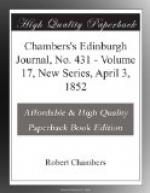In 1814, Dr Dickson visited Scotland, and was received as a beloved and honoured guest at the table where, long ago, he had waited as a servant, and where had sat the stranger gentleman in regimentals, who clapped him on the shoulder, and spoke to him words of encouragement which perhaps had sunk deeper into his mind than he was conscious of himself. His native politeness had always been remarkable, and now his general information and agreeable manners made his society a true acquisition. After a few months’ visit, he left Scotland never to return. Again he went abroad, and finally settled at Tripoli, the African port on the Mediterranean, under the Turkish dominion. Here the sultan’s viceroy, the pacha, soon appointed Dr Dickson to be his chief physician—a post which he held for thirty years under various successive pachas, although the rival claimants for vice-regal authority sometimes fought so fiercely, that the English residents were glad to seek shelter in Malta, until it was decided who should reign. Still, Dr Dickson never lost his office, which has now descended to his son; an extraordinary instance of permanent favour under so arbitrary a government. Dr Dickson had married a Scottish lady, and being now settled in every way, his life, so far as we know, affords no farther incidents necessary to record. It was a career, however, of continued usefulness and benevolence, and, surrounded by a promising family, who revered their father, we believe he enjoyed as much happiness as usually falls to the lot of humanity.
One only drawback there was to the favour in which he stood with the pacha: the doctor was obliged, when attending the high ladies of the court, to drink in their presence one-half of every drug he prescribed—a custom it might not be amiss to introduce into England, although not with the view, as in Tripoli, of guarding against poison! Dr Dickson also acted as consul for Portugal, although for many years he received no salary: at last, on paying a flying visit to London, two years before his death, he was recommended to go home by Lisbon to seek redress. He found, however, that amid the clash of political factions, justice was difficult to be found, and so he gave up both the search and the post.




